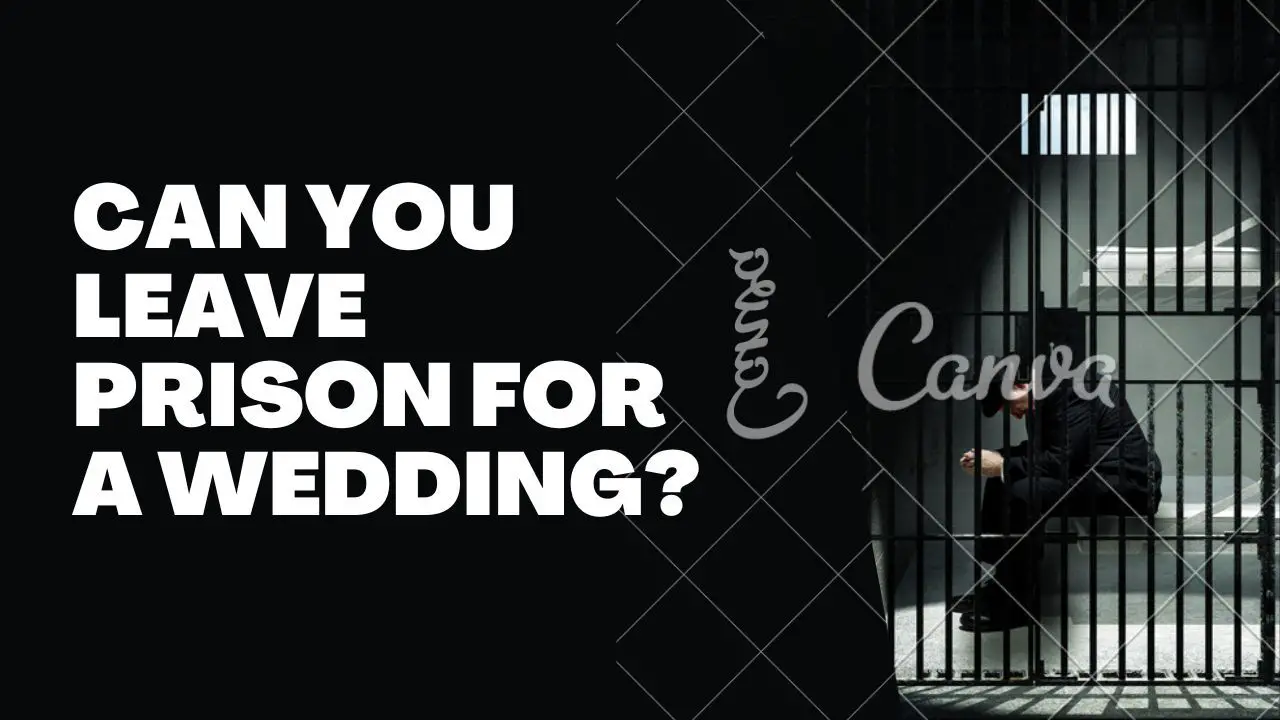Can You Leave Prison For a Wedding?
In this article, we explore the reality of furloughs, their purpose, eligibility, and the impact of high-profile cases that have shaped public perception.

Leaving prison for a wedding—a cherished life event that brings joy and celebration to the hearts of many. However, attending such occasions can seem like an unattainable dream for inmates.
The concept of prison furloughs, temporary releases for inmates, has sparked curiosity and hope among those yearning to be a part of their loved ones' special moments. But can an inmate really leave prison for a wedding?
In this blog, we explore the reality of furloughs, their purpose, eligibility, and the impact of high-profile cases that have shaped public perception.
What is a Prison Furlough?
A prison furlough is a sanctioned temporary leave from a correctional facility given to a prisoner for particular purposes like attending funerals, attending medical emergencies, or making contact with potential employers for employment after release.
There are two types of furloughs: escorted and unescorted. Escorted furloughs need the presence of guards and may cost the convict money.
The Federal Bureau of Prisons and state institutions view furloughs as instruments to accomplish particular correctional objectives rather than rewards for good behavior or sentence reduction. Enhancing community reintegration and lowering recidivism are two of these objectives.
While some evidence suggests that furloughs can reduce violent incidents, there have been instances of furloughed prisoners committing crimes while on leave.
What Was the Willie Horton Case and What Impact it has on Prisoners?
The 1988 presidential election brought prison furloughs to the forefront of public debate, thanks to the infamous Willie Horton case. When Michael Dukakis was governor of Massachusetts at the time, Willie Horton was serving a life sentence for first-degree murder.
However, ten "weekend passes" were authorized for him. During one of these furloughs, Horton committed heinous crimes, including kidnapping, stabbing, and rape. This led to a devastating attack ad against Dukakis and forever changed the public's perception of furlough programs.
The Horton case influenced the tough-on-crime narrative and significantly curtailed the use of furloughs in federal and state institutions.
The fear of releasing dangerous criminals during furloughs led to a shift towards stricter policies on temporary release programs, making it highly unlikely for inmates to be granted furloughs for events like weddings.
So, Can You Leave Prison For a Wedding?
Unfortunately, the response is categorically "no." The three main criteria for granting furloughs—family crises, medical emergencies, and work-related reasons—do not apply to weddings.
Furloughs are not intended for celebratory events like weddings but are reserved for urgent and necessary situations.
Prison administrators are cautious when granting furloughs, considering factors such as the inmate's behavior, crime severity, public safety risk, and staff availability to accompany the prisoner.
Compassionate release for dying inmates is often difficult to obtain, making it highly improbable that an inmate will be allowed to attend a wedding, even on a temporary basis.
Read Can You Be a Prison Officer With Epilepsy?
The Importance of Staying Connected
While the inability to attend significant life events like weddings can be emotionally challenging for inmates, staying connected with loved ones is still critical for their rehabilitation.
Prisoners should take advantage of approved means of communication, such as letters, phone calls, and video visits, to maintain strong relationships with family and friends during their incarceration.
Furloughs are a privilege granted under exceptional circumstances, and prisoners must understand that their sentence includes a temporary separation from society. Inmates need to focus on rehabilitation and productively use their time in prison to prepare for successful reintegration into the community upon release.
ReadPrivate Prisons In The State Of Maryland
Can you Get Married in Prison?
Yes, inmates can get married in prison. Despite the confines of their incarceration, prisoners have the right to marry like any other individual. However, the process of getting married while in prison varies depending on the jurisdiction and specific correctional facility rules.
As we mentioned before, prisoners can't attend anyone’s wedding, but they can get married in prison. And to proceed with a prison wedding, the inmate must first express their desire to marry to the prison authorities.
Typically, they will need to submit a formal request to the prison administration, indicating their intention to marry a specific individual and outlining the reasons for the marriage. The prison authorities will review the request and consider various factors, such as security concerns and the parties' welfare.
If the prison administration grants permission for the marriage, the couple can proceed with the necessary arrangements. A jail wedding can, however, involve more complicated planning than a regular wedding.
In most cases, the wedding ceremony occurs within the prison facility's confines. Family and friends of the inmate and their partner may be allowed to attend the ceremony. Still, they will need to adhere to the prison's strict visitation rules and security protocols.
The couple may also be subject to certain restrictions during the wedding ceremony, such as limited physical contact and supervision by prison staff.
Additionally, depending on the prison's rules, the couple may or may not be allowed to exchange rings or have any physical displays of affection.
The Potential for Furlough Reforms
The potential for furlough reforms has sparked an ongoing debate about granting furloughs to non-violent offenders or inmates with exemplary behavior records near the end of their sentences.
Advocates believe that carefully managed furlough programs can aid in successful reintegration and reduce recidivism rates.
One proposed reform is to consider granting furloughs to non-violent offenders who have demonstrated genuine remorse and commitment to rehabilitation. Advocates believe that supervised furloughs can incentivize good behavior and motivate positive progress within the prison system.
Additionally, it is gaining support to explore furlough opportunities for inmates near the end of their sentences and with exemplary behavior records. Proponents argue that supervised furloughs could help smooth their transition back into society, reducing the risk of recidivism.
Critics emphasize the potential risks associated with temporary releases and the need for close monitoring and additional resources to mitigate those risks effectively.
Conclusion
the possibility of leaving prison for a wedding remains highly unlikely due to the stringent guidelines surrounding furlough programs. While attending such significant life events is appealing, prison administrators prioritize public safety and strict adherence to correctional goals.
